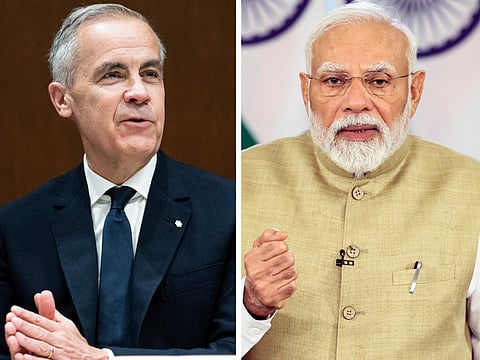Will Modi get a G7 invite? India awaits word from Canada as summit nears
Kananaskis hosts June 15–17 gathering amid frosty ties following 2023 diplomatic standoff

Dubai: With the G7 Summit set to take place from June 15 to 17 in Kananaskis, Alberta, India’s participation remains uncertain, as an official invitation from host country Canada has yet to be extended.
If the invitation does not come through, it would mark the first time since 2019 — excluding 2020, when the summit was cancelled due to the pandemic — that Prime Minister Narendra Modi does not attend the G7 gathering.
In recent years, India has actively engaged in the summit’s outreach sessions, reflecting its growing role in global affairs.
This year’s summit, however, comes against a backdrop of strained India-Canada relations.
What’s G7?
The G7 is an informal group of seven major advanced economies — the US, UK, Canada, France, Germany, Italy, and Japan — and the host country each year has the discretion to invite additional countries or leaders as “guest” participants. There’s no formal treaty or legal obligation governing invitations.
The G7 operates by consensus but is not a formal international organisation like the UN.
The host country typically decides who to invite beyond the core members, often inviting guest countries or leaders from emerging economies, global partners, or regional stakeholders.
Invitations can reflect diplomatic priorities, strategic considerations, or efforts to include important voices on specific agenda topics.
Sometimes invitations are extended to countries with strong economic ties, strategic relevance, or shared interests on global issues.
So, the host Canada has the authority to decide whether or not to invite India to the 2025 summit. Invitations are political decisions influenced by bilateral relations, global diplomacy, and current affairs.
Tensions escalated in 2023 after then-Prime Minister Justin Trudeau alleged a possible Indian link to the killing of a Canadian national associated with the Khalistan movement.
Also Read: India, Canada move to mend diplomatic ties
India firmly rejected the allegation, calling it unfounded and politically motivated.
As Canada prepares to host world leaders to address pressing global issues such as the Russia-Ukraine conflict and tensions in West Asia, people familiar with the matter say a visit by Prime Minister Modi is unlikely.
Also Read: Trudeau trip sours India-Canada ties
They point to the delicate state of bilateral relations, which would have required significant diplomatic groundwork for such a high-level engagement.
Ties between the two countries were further impacted when both sides scaled back diplomatic missions in late 2023.
India recalled its high commissioner and several senior diplomats after Ottawa attempted to link them to the Nijjar case. In response, Canada withdrew an equal number of its representatives from New Delhi.
Despite the diplomatic chill, channels of communication have remained open. In recent months, Indian and Canadian security officials resumed contact, and discussions are reportedly underway on the possibility of appointing new high commissioners.
Mark Carney's election raised cautious hopes
The recent election of Liberal Party leader Mark Carney has raised cautious hopes in New Delhi for a potential reset. However, officials note that there has been no substantive move yet from the new Canadian administration to address India's concerns over the activities of pro-Khalistani groups in the country.
"The relationship needs to be based on mutual trust and sensitivity," Ministry of External Affairs spokesperson Randhir Jaiswal said in March.
He added that the downturn in relations stemmed largely from the space given to extremist and secessionist elements, which India believes have disrupted the diplomatic atmosphere.
Quiet diplomacy
While formal ties remain strained, both sides appear open to exploring avenues for de-escalation. Quiet diplomacy continues behind the scenes, and officials say restoring normal diplomatic representation remains a shared interest.
Prime Minister Modi last attended the G7 summit in Italy in 2023 — his fifth appearance at the high-level gathering.
He also took part in previous summits held in Germany (2022), the UK (2021), and France (2019), bringing India’s voice to discussions on global development, climate change, and security.
Even if India does not participate in this year’s summit, officials stress that the country remains committed to international cooperation and will continue to engage with the G7 and other global partners on matters of shared importance.
Sign up for the Daily Briefing
Get the latest news and updates straight to your inbox




